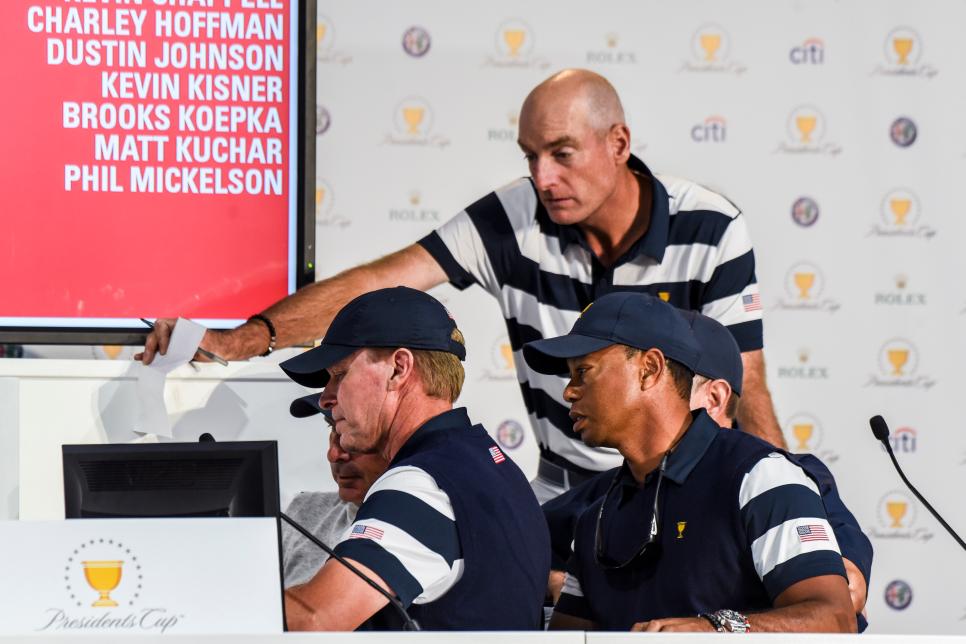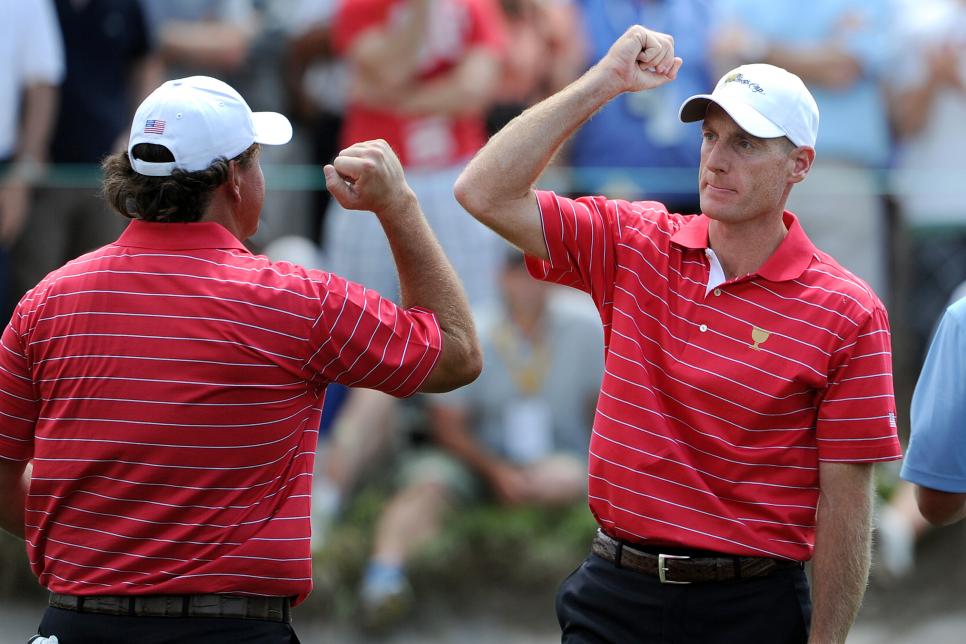[PHOTO: Scott Halleran]
Not that Jim Furyk is alone in this distinction among American golfers of a certain age, but when it comes to his personal history in the Ryder Cup and the Presidents Cup, Furyk has experienced wildly divergent fortunes.
In his nine appearances as a competitor against Europe, Furyk posted a record of 10-20-4 and was a part of only two winning teams, in 1999 and 2008. He was also the US captain in 2018 when the Americans got pounded in Paris, 17½-10½. Meanwhile, the former US Open champion owns a 20-10-3 mark in seven Presidents Cups in which the American side went 5-1-1. His service this week at Royal Montreal as US captain is likely to be his closing chapter in these events.
He does not want to go out with a loss. His passionate, epithet-laden response to an American writer who made the mistake of saying he would welcome a long-overdue International victory hints at Furyk’s determination to extend the American win streak to 10 straight matches dating to 2005. But that streak, and the mere fact that the US has lost only once (in 1998) in the 30 years of the Presidents Cup, are becoming a heavy weight for American captains to lug around.
“Given the success we’ve had, no one wants to be the next losing captain of the Presidents Cup,” said Davis Love III, who was the winning skipper in 2022. “I felt that a little bit in Charlotte. You want to keep the streak going. You know it’s going to end at some point, but you just hope it’s not on your watch. It’s a unique kind of pressure.”

Furyk, 54, is not immune to the sense that the pressure exists. That and the pride he takes in the position of leading a team that represents his country have driven him to divert most of his energies to ensuring that not only can the US squad succeed in Canada but that his efforts in some way carry over to the 2025 Ryder Cup.
“You’re always trying to build on the things we’ve done and it’s the same with this team, too,” Furyk told Golf Digest in June at the Memorial Tournament. “We’ve had a lot of synergy through the years, and a lot of the same captains, and we’ve tried to do things a lot of the same ways so the guys know what to expect year in and year out. We build on our good years and on the years that we didn’t win, as well. We learn some lessons and try to keep moving the US team down the same track.”
The US squad is still learning how it can pierce the Europeans’ armour when the Ryder Cup is contested abroad. Furyk found out how difficult that was at Le Golf National in Paris six years ago when he watched a seasoned and talented American contingent fall apart. After a 3-1 start in the first four-ball session, the US won only three more points in the next three team sessions and was shut out in afternoon foursomes after its promising morning effort the first day.
As the captain, Furyk took the brunt of the criticism for the blowout loss, but he handled it with his usual equanimity, even though it hurt. Playing a clearly exhausted Tiger Woods four times was among his biggest miscalculations. Coming off a victory in the Tour Championship, Woods went 0-4-0 and never played the 18th hole.
“I think you’ve heard me say this,” Furyk began, “and I always laugh when people ask me, ‘Well, would you have done anything differently?’ How damn arrogant would you have to be to say no? After the team doesn’t win and you go, ‘Nope, I’d do everything the same.’ I’d just be saying, ‘It wasn’t me; it was them.’ Look, we’re all in this together. So, of course, you second-guess decisions made along the way, and you try to learn from that.”

Furyk wouldn’t divulge what lessons he took away from that Ryder Cup, careful to not give his International counterpart Mike Weir any information that could be used against the US. Suffice to say that pairings will reflect some of what he gleaned from Paris. His leadership style will be similar. He can’t change who he is – a fiercely competitive individual who always wanted the ball in his hands when playing high school team sports. He’s used to pressure. He welcomes it.
One of his greatest attributes is a refusal to think about what it would mean to lose. So he doesn’t. “I never go down that road,” said Furyk, who won 17 PGA Tour titles (including, interestingly, the Canadian Open. Twice) and is the only player to twice break 60 on tour, including the lone 58. “That’s a bad way of approaching things. From the perspective of being a captain, it’s all about putting guys in a position to succeed and that’s all.”
If there is a danger for the Americans this week, it’s in the ‘away’ assignment. They endured close calls in 2015 in South Korea and 2019 in Melbourne to keep their streak alive. Furyk expects the International team to battle hard. But at least he knows what it’s like to lead a team abroad. Ever the optimist, he recently remarked that there will be hints of home to savour at Royal Montreal.
“I like to joke that what I really like about Montreal is they love their Habs, the Canadiens, and everything is red, white and blue up there. It looks really nice,” Furyk said. “They like to tell me it’s actually blue, white and red; I go, ‘Hey, you see it the way you want to see it, I see red, white and blue.’”
The trick is to see enough red on the board come Sunday to signal another US victory.

